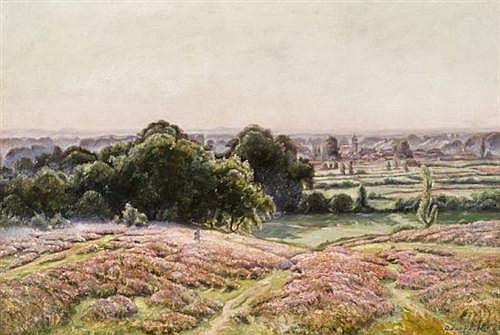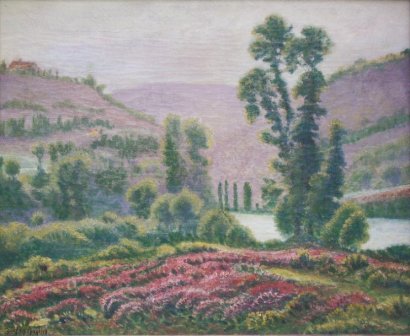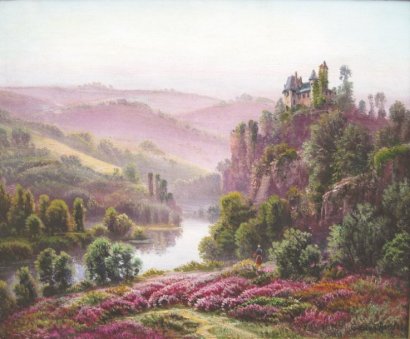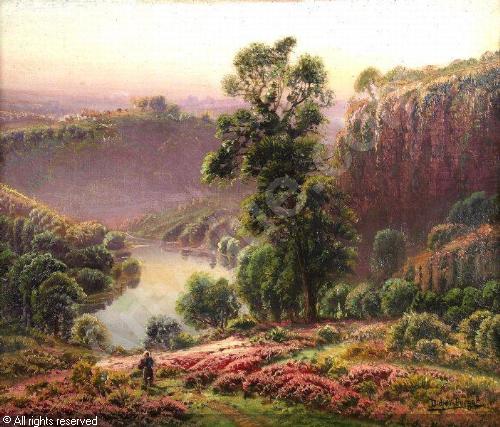Read the tale of heather honey. Heather honey, Scottish ale
Lesson objectives:
Personal: to know information about the life of the writer, the events that are told in the ballad.
Metasubject: the ability to highlight the main thing in the text; answer the questions posed.
Subject: understand what character traits the author glorifies; to be able to find signs of the ballad genre in RL Stevenson's "Heather Honey".
Lesson type: Reading lesson and discussion of the work.
During the classes:
“I believe everyone will be there,
Where he strives all his life. "
R.L. Stevenson.
Organizing time
Knowledge update
Work on the topic of the lesson
Teacher's word.
R.L. Stevenson was born on November 13, 1850 in Scotland, in the city of Edinburgh. The parents of the future writer were wealthy people. Stevenson's grandfather and dad built lighthouses. His father took him to work with him. Therefore, young Robert was attracted by everything that was associated with the sea. The boy liked to sit on the shore for a long time, he watched the waves for hours, listened to stories about shipwrecks, about various sea adventures and dream. All this fed the boy's imagination and awakened love for native land, to the history of Scotland: bright, contrasting, gloomy, full of romanticism and tragedy.
The life of the writer was not easy. By inheritance from his mother, Robert got a serious illness - tuberculosis, and he was bedridden for a long time. This is a very terrible, at that time, incurable disease.
But… dreams about travels, about the sea, which seemed to be impossible, helped to overcome the disease: pen and paper came to the rescue of the boy.
Robert Lewis tried to write down everything he saw on paper.
Robert Louis Stevenson known to readers all over the world as the author of the novel "Island treasures "(1883), which has been the favorite book of children and adolescents for over a hundred years. Stevenson wrote many other novels as well, but it was Treasure Island that made his name so popular. As a child, the future writer amazed everyone with the richness of his imagination and the ability to narrate in an unusually interesting way.
At the insistence of his father, Stevenson studied for several years in engineering, and then at the law faculties of the University of Edinburgh, and even received the title of lawyer. But the love of writing turned out to be stronger.
It was very difficult to overcome the resistance of his parents, who wanted him to pursue a career as a lawyer, but young man it succeeded. He becomes a writer.
“I thirsted for life, thirsted for adventure, with a huge effort of will I practically defeated the disease. Love for the Motherland and its history gave me strength. I fought and lived, ”he wrote in his memoirs.
Robert Stevenson constantly had to suffer blows of fate and fight for his existence.
Listen to what the doctor prescribed to the young writer when he was only 24 years old: “Absolute peace, no worries, not even pleasant ones; do not eat too much, do not drink too much, do not laugh too much; you can write a little, really a little, talk very little and walk as little as possible. "
But Stevenson did everything the other way around: the contraindications say "no worries", but he constantly got into different stories, the doctor forbids moving a lot, and he sailed on a boat and hiked different countries, and was able to build a house on the island of Samoa in the Pacific Ocean.
Stevenson writes: “For 14 years I did not feel healthy for a single day, I woke up sick and went to bed exhausted, and all this time I worked, not deviating from my duty and the intended path. I wrote in bed, wrote when my throat was bleeding, wrote when I had a chill, wrote, torn apart by a cough, wrote when my head was spinning from weakness, and it seems to me that I honorably lifted the glove thrown to me by fate, and won the battle with life.
For four years Stevenson lived with his family on the island of Samoa, and the fact that the local natives loved and respected him is evidenced by the following fact: in order to bury him, on purpose - in complete silence on a vow - they voluntarily cut a trail through the rainforest to the top of high Mount Weah. And there, on the gravestone, the lines from Stevenson's poem were engraved:
Under starry sky, in the wind
I will choose the last place.
I lived happily, I will die easily.
And I'm ready to lie in the grave.
Write on the gravestone like this:
“Here he wanted to leave a sign,
He returned from the sea, a sailor came,
And the hunter returned from the hills. ”
We met with such a person of difficult fate. Stevenson wrote many books, after his death more than 30 volumes were published. The most famous were the works Treasure Island, Black Arrow, Kidnapped.
Among small genres, it gained particular popularity ballad “Heather honey”.
Work on the ballad.
Once upon a time, they lived in Scotland. They were an extraordinary people. As the legend says, they were engaged in the production of honey, so sometimes they were also called mead brewers. Their honey was not simple, but heather, i.e. cooked from heather - an extraordinary flower that grows in Scotland.
Whole thickets of this plant exist there.
We listen to the audio recording of the ballad.
VERESKOVY HONEY.
Heather drink
Forgotten a long time ago.
And he was sweeter than honey,
Drunker than wine.
They cooked it in cauldrons
And drank with the whole family
Baby Mead Brewers
In caves underground.
The king of Scots has come
Ruthless to enemies
He drove the poor picts
To the rocky shores.
On a heather field
On the battlefield
Lay alive on dead
And the dead is on the living.
_______
Summer has come in the country
The heather is blooming again
But there is no one to cook
Heather honey.
In their cramped graves,
In the mountains of the native land
Baby Mead Brewers
We found shelter for ourselves.
The king is riding the slope
Above the sea on a horse
And seagulls are flying nearby
On a par with the road.
The king looks sullenly:
"Again at my edge
Honey heather is blooming,
And we don't drink honey! "
But here are his vassals
Have noticed two
The last mead brews
Survivors.
They came out from under the stone,
Squinting at the white light -
Old humpback dwarf
And a boy of fifteen.
To the steep sea shore
They were brought in for questioning
But none of the prisoners
He didn’t say a word.
The king of Scots sat,
Without moving, in the saddle.
And little people
We stood on the ground.
The king angrily said:
"The torture of both awaits,
If you don’t say, damn it,
How did you prepare honey! "
The son and father were silent,
Standing at the edge of a cliff.
Heather rang above them,
"Listen, Scottish king,
Talk to you
Let me see you face to face!
Old age is afraid of death.
I'll buy life by betrayal,
I will give away the cherished secret! "-
It sounded sharp and clear:
"I would have betrayed the secret long ago,
If the son did not interfere!
The boy does not feel sorry for his life,
He doesn't care about death ...
I sell my conscience
It will be ashamed to be with him.
Let him be tied tightly
And they will throw you into the abyss of waters -
And I will teach the Scots
Cooking old honey! .. "
Strong Scottish Warrior
Boy tied tight
And threw it into the open sea
From the coastal cliffs.
The waves closed over him.
Freeze the last cry ...
And echoed to him
From the cliff, the old father:
"I told the truth, the Scots,
I expected trouble from my son.
I did not believe in the fortitude of the young,
Do not shave their beards.
And the fire is not terrible for me.
Let it die with me
My holy secret
My heather honey!
Consolidation of the studied material.
Dictionary work.
The nobleman is here: the person who leads the country, the ruler, the ruler.
Deeps, Nurts, Nurts - a whirlpool.
Guys, define the theme and main idea of the work.
Topic: the death of the last people from the small people of the mead brewers.
The main idea: the struggle for independence and freedom against the conquerors.
Conversation
Uch-k: REMELESS
How did father and son die? Why did the old man decide to deceive the Scots?
Uch-k: I was afraid that my son would not stand the torture, wishing for him an easier and faster death than at the stake.
Why is heather honey a "holy secret" for an old man?
Uch-k: Because these are their traditions, if you pass them on, it means betraying your history, your people.
In the name of what does the old man perform his feat?
Uch-k: In the name of preserving the memory of ancestors, in the name of loyalty to their Motherland.
- "Heather Honey" is a ballad. Why do you think Stevenson turned to this genre?
Uch-k: He wrote about the legendary historical times of Scotland, imitating the folk epic. He found it easier to express the idea of loyalty to the Motherland in such a genre as a ballad.
We already remembered today what a ballad is. Find the ballad features in Heather Honey.
Uch-k: Historical plot, a tragic episode in the history of the war, a tragic episode - the death of the last Picts, heroes are true patriots, an element of mystery - a recipe for honey that dies with the heroes; the characters of the heroes are revealed in a dramatic dialogue, the author's emotional sympathy; landscape opening and landscape ending.
V... Summing up the lesson. Reflection.
Finish the phrase:
After reading the ballad, I came (came) to the conclusion ...
The most interesting thing about the ballad is ...
In the place of the old pict, I would ...
So what does this piece make you think about?
Uch-k: About courage and boldness, about the cruelty of the heart, about the preservation of the holy secret, etc.
Stevenson had the same thoughts and feelings when he first heard the story of the conquest of the Picts, and then put it in a literary way. So that the memory of the courageous and brave Picts lived in the hearts of people, so that everyone thinks about such vices as cruelty, anger, anger, what they can lead to.
D / Z. Write an essay on the topic:
My perception of Stevenson's ballad Heather Honey.
In fact, having visited Scotland, I was pleasantly surprised that it was not forgotten, thank God, they still cook and different ways... For example, here's a recipe:
For "Heather Honey" you will need: 20 g of flowers, 500 g of sugar, 1 liter of water.
Pour boiling water over the flowers, leave for 24 hours, strain, add sugar, bring to a boil and pour into glass jars.
Drinks from VERESK:
1) Boil 5 g of dried flowers in 1 liter of water for 3 minutes, discard the grass, add 80 g of honey, stir.
2) 40 ml of heather syrup, 20 g of currant leaves, 300 ml of water. Cook currant leaves for 7 minutes, strain, then add syrup. It is better to drink chilled.
(This article is illustrated by art by William Didier-Pouget, Gaston Vincent Anglade and Rex Preston, for more information on artists in the Pro-Art community, see)

Heather is, first of all, a magnificent honey plant with a pleasant smell; it grows in the tundra, pine forests, peat bogs, burnt-out areas, and sands. As a rule, this honey plant is found in Ukraine, countries Western Europe, in Siberia, in the European part of Russia, in the Azores and in Asia Minor, there is even in the north and west of Africa. However, the largest moorlands (which are huge thickets that form with certain other species of the Erica genus) are found in Scotland. The heather fields there occupy about 75% of the heathlands around the world.
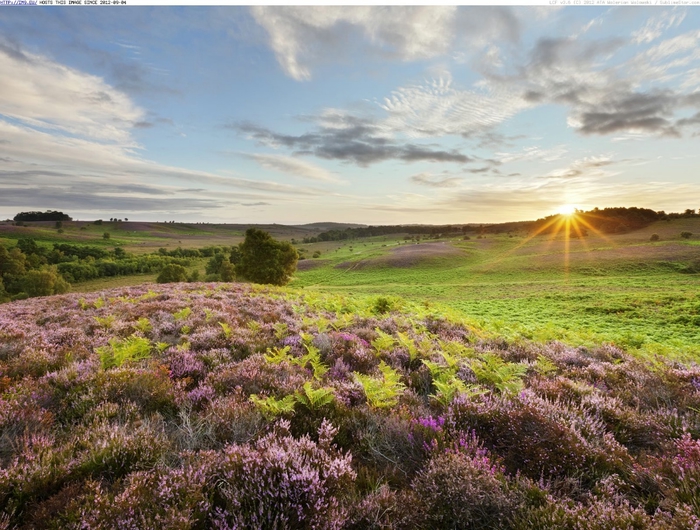
Someone likes the taste of heather honey, someone rejects its unusual bitterness. However, true connoisseurs in Great Britain value this honey so highly that the name "honey Rolls-Royce" is stuck behind it.

An indescribable aroma is the first thing that attracts in heather honey. Moreover, its taste is tart and even slightly bitter. Remains after its use and a fairly strong aftertaste. The color of heather honey is dark yellow to yellow-red, and upon crystallization it acquires a reddish-brown hue. Some people even compare heather honey in flavor to toffee. The taste of this honey becomes stronger and more expressive during long-term storage.

Heather honey contains a large amount of protein substances (about 2%), which is also its difference. This contributes to the fact that during long-term storage it does not crystallize, but acquires a jelly-like form. However, when stirring, honey becomes liquid again, but over time it thickens again.
"Heather honey" (translated by Valery Rastorguev - naturally it is impossible to surpass the melodiousness of the narrative of neither Stevenson nor Marshak - it somehow turned out clumsily, so I will only cite an excerpt, but the guy tried :-).
In Scotland, honey heather grew on the slopes of the mountains.
And every inhabitant firmly believed that he gave them strength.
When the drink is precious that was more life-giving than wine
They cooked, knowing the price, then the whole country rejoiced.
But then one day it happened, the King decided to find out the secret,
I went to war, not knowing mercy, there is no mercy to the mead brewers.
At the root of a small people, he exterminated without regret.
And the heather is already blooming, blood red as a sign.
And he is filled with strength, ready to spill, living nectar.
But only corpses and graves, almost every one contains a mead brew.
I am old and let him die with me, forever in eternity, melting, fragrant honey from Heather.
Copyright: Valery Rastorguev, 2012.
The Dalriada area was cleared of the Picts during the "scottization" of Scotland, but the tradition of making heather ale continued to live, especially in the Highlands (Highlands, Highlands). By the 12th century, the lands of the Picts and Dalriada had merged and the country of Scotland was born, the Gaels called it "Alba", and heather ale became a familiar drink in the clans.



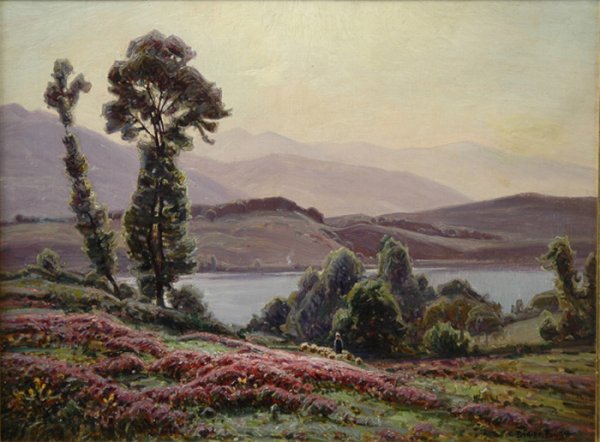

Leann fraoch(pronounced "lyan fray oogh" with a soft "oogh", layen freyuh) in Gaelic (the language of the Scottish Celts) means fraoch beer. The Bell heather plant, also called Bonnie bells (Erica tetralix, Marsh heather, and E. cinerea), has bell-shaped flowers in white to purple colors and blooms from April to June. The Ling heather or Broom heather plant (Calluna vulgaris) has small, bud-shaped flowers that are white, red, or purple and bloom from August to September.
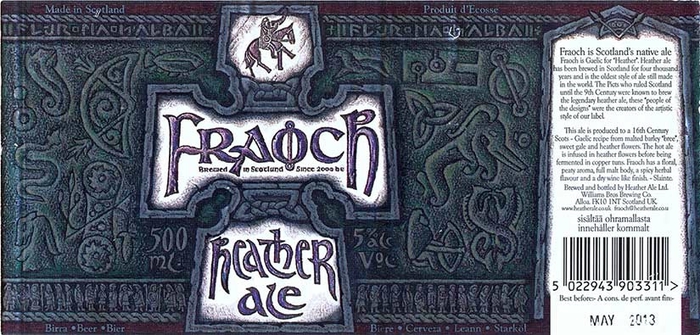
| For brewing needs, use only the top five centimeters of the plant, within 36 hours of harvest, or must be stored below 38 degrees F (3 degrees C) due to the fact that it loses its valuable aroma. Moss (fog) grows on a lignified stem within the heather plant, not near flowers, and contains wild yeast. Fog has some narcotic properties that have been dropped from commercial recipes. Moss grows deep in the stems, but it flies in the air when flowers are picked. It is a light white powder that can be easily removed by rinsing the plants in cold water. Heather ale is without doubt the oldest brewing heritage in Scotland. The drink was prepared as follows: |
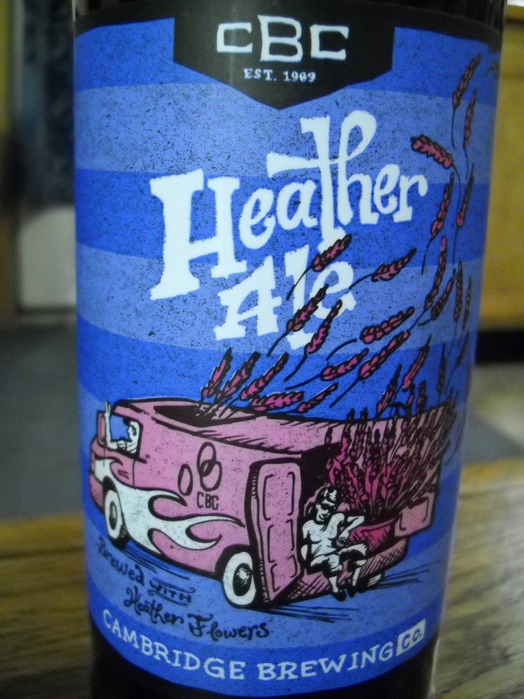 |
 |
First, they made a mash from Scottish ale malt, boiled the wort with flowering heather tops, then covered its surface fresh flowers heather, left to cool and fermented for 12 days, until the heather turns black. The ale was drunk straight from a container called a cran (barrel), in which a hole was made a quarter of the height for a tap. This amber, lightly carbonated ale with mild bitterness, strong oily body and wine-like, during the days of the Auld Alliance in the 18th century, the French called Scottish Burgundy and the British called Scottish Malvasia. |
Here is a real commercial heather ale recipe from Glenbrew, BruceWilliams, 736 DumbartonRd., GlasgowG116RD:
Heather ale
Components for 5 gallons (20 liters)
6 2/3 pounds (3 kilograms) ground Scottish ale malt, or 6 pounds (2.7 kilograms) American malted two-row barley and 10.5 ounces (300 grams) amber malt (crystal or Cara-type)
12 2/3 cups (3 liters) lightly compressed heather flower tops
3/10 ounce (8 grams) Irish moss (10 minutes)
2 3/5 gallons (10 liters) soft water Lager yeast
1/2 to 3/4 cup corn sugar (for carbonation)
Original Density: 1.048 Final Density: 1.011
Mash the malt at 153 degrees F (67 degrees C) for 90 minutes. Flush to collect 5.25 gallons (20 liters). Add about half a gallon (2 liters) of lightly pressed heather tops and cook over high heat for 90 minutes.
Pass the hot wort through a sieve filled with 2 cups (0.5 liters) of heather tops into a fermentation tank. Let cool and ferment at 61 degrees F (16 degrees C) for seven to 10 days. I recommend using lager yeast. I originally used Scotch ale yeast, but over the years of cold, slow fermentation, a bottom-fermenting race has evolved. When gravity reaches 1.015, usually on the fifth day, take 1/2 gallon (2 liters) of ale, add 2 cups (1/2 liter) of heather flowers to it and heat to 158 degrees F (70 degrees C). Cover and simmer for 15 minutes, then return to fermenter.
![]()
And finally, the lyrics of Stevenson's original ballad with voice over video. And yet, (by the way) about how useful it is to be able to read works in the original - in the English edition of the Ballad, Stevenson himself mentioned that picts "little people"(English dwarfish folk) were not actually destroyed, but assimilated by the Scots in the 9th-10th centuries.
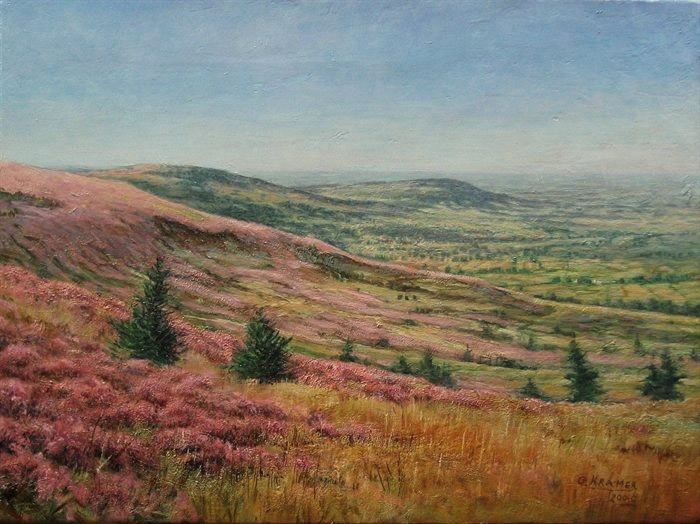
|
Heather Ale: A Galloway Legend by Robert Louis Stevenson 1880 From the bonny bells of heather, They brewed a drink long syne, Was sweeter far than honey, Was stronger far than wine. They brewed it and they drank it, And lay in blessed swound, For days and days together, In their dwellings underground. There rose a King in Scotland, A fell man to his foes, He smote the Picts in battle, He hunted them like roes. Over miles of the red mountain He hunted as they fled, And strewed the dwarfish bodies Of the dying and the dead. Summer came in the country, Red was the heather bell, But the manner of the brewing, Was none alive to tell. In graves that were like children "s On many a mountain "s head, The Brewsters of the Heather Lay numbered with the dead. The king in the red moorland. Rode on a summer "s day; And the bees hummed and the curlews Cried beside the way. The King rode and was angry, Black was his brow and pale, To rule in a land of heather, And lack the Heather Ale. Never a word they spoke: A son and his aged father - Last of the dwarfish folk. The king sat high on his charger, He looked down on the little men; And the dwarfish and swarthy couple Looked at the king again. Down by the shore he had them: And there on the giddy brink - "I will give thee life ye vermin, For the secret of the drink. " There stood the son and father And they looked high and low; The heather was red around them, The sea rumbled below. And up spoke the father, Shrill was his voice to hear: "I have a word in private, A word for the royal ear. "Life is dear to the aged, And honor a little thing; I would gladly sell the secret ", Quoth the Pict to the King. His voice was small as a sparrow "s, And shrill and wonderful clear: "I would gladly sell my secret, Only my son I fear. "For life is a little matter, And death is naught to the young; And I dare not sell my honor, Under the eye of my son. Take him, O king, and bind him, And cast him far in the deep; And it "s I will tell the secret That I have sworn to keep. " Neck and heels in a thong, And a lad took him and swung him, And flung him far and strong And the sea swallowed his body, Like that of a child of ten; And there on the cliff stood the father, Last of the dwarfish men. "True was the word I told you: Only my son I feared; For I doubt the sapling courage, That goes without the beard. But now in vain is the torture, Fire shall not avail: Here dies in my bosom The secret of the Heather Ale. " Translated by S. Marshak (1941) |

|
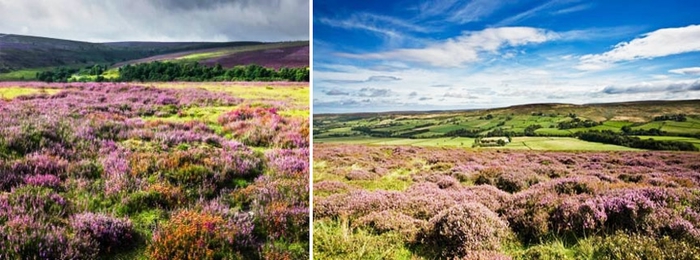
From the heather, the drink Forgotten a long time ago. And he was sweeter than honey, Drunker than wine.
They boiled it in cauldrons And drank it with the whole family Little mead brewers In caves underground.
Came the king of Scots, Ruthless to the enemies, He drove the poor Picts To the rocky shores.
On the heather field, On the battlefield Lying alive on the dead And dead on the living.
Summer has come in the country, Heather is blooming again, But there is no one to cook Heather honey.
In their cramped graves, In the mountains of their native land, Little meadovars found shelter for themselves.
The king rides along the slope Above the sea on horseback, And seagulls are flying next to With the road on a par.
The king looks sullenly: "Again in my land Blossoms of honey heather, And we do not drink honey!"
But his vassals noticed two Last Mead Brewers, Survivors.
They came out from under the stone, Squinting at the white light, - An old hunchbacked dwarf And a boy of fifteen.
They were brought to the steep seashore for interrogation, But not one of the prisoners uttered the Word.
The king of Scots was sitting, Without moving, in the saddle. And the little people stood on the ground.
The king angrily said: "The torture of both awaits, If you do not say, devils, How did you prepare honey!"
Son and father were silent, Standing at the edge of the cliff. Heather rang above them, Shafts rolled into the sea.
Old age is afraid of death. I will buy life by betrayal, I will give away the cherished secret! "- The dwarf said to the king.
The boy doesn’t feel sorry for his life, He doesn’t care about death ... I’ll sell my conscience. I’ll be ashamed to be with him.
Let him be tightly tied And thrown into the abyss of waters - And I will teach the Scots How to cook ancient honey! .. "
Strong Scottish warrior Tied the boy tightly And threw him into the open sea
From the coastal cliffs.
From the cliff, the old father:
The waves closed over him. The last cry froze ... and it echoed
From the cliff, the old father:
"I told the truth, Scots, I expected trouble from my son.
I did not believe in the fortitude of the young, Do not shave their beards.
And the fire is not terrible for me. Let it die with me
My sacred secret is My heather honey! "

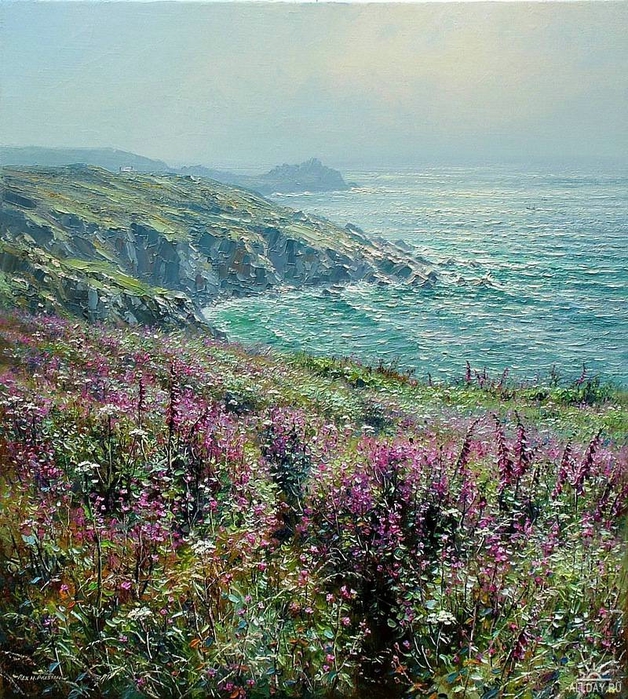
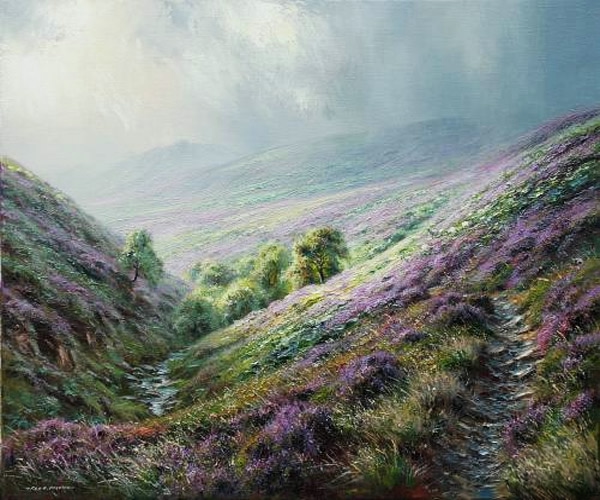
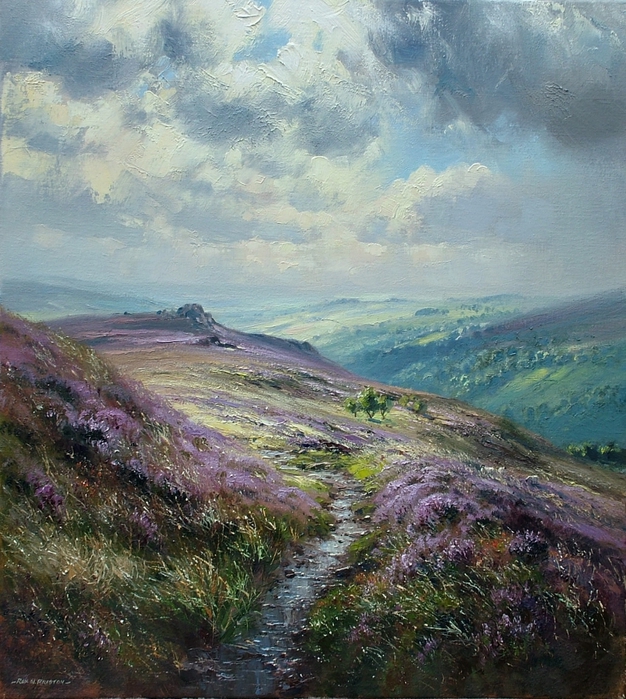


By the way, the very first translation into Russian of this ballad was made by Nikolai Chukovsky in 1939, but in comparison with Marshakovsky, who loved from childhood, both the rhythm and the style, in my opinion, play great, judge for yourself, I give the full text:
N. Chukovsky's translation: Heather beer
(Scottish tradition)
| Tore up the hard red heather And brewed from it Beer is stronger than the strongest wines, Sweeter than honey itself. They drank this beer, drank it - And for many days afterwards In the darkness of underground dwellings They fell asleep in a friendly sleep. But the king of Scots came Merciless for enemies. He defeated the Pictish troops And he drove them like goats. On steep crimson slopes He flew after them And scattered all over the place Piles of dwarf bodies. Summer again, heather again. All in bloom - but how can it be, Kohl the living do not know how A sweet feast to cook? In children's little graves On the hill and over the hill Everyone who knew how to brew beer Sleep forever dead sleep. Here is the king of the crimson field Rides into the sultry summer heat Hears the well-fed bees hum, Singing birds over themselves. He is gloomy and displeased - What can be sadder: Rule the heather kingdom Don't drink sweet beer? Following him the vassals gallop Through the heather. Suddenly they look: Behind a huge old stone Two dwarfs are sitting. Here they are driven and grabbed. Captured finally The last two dwarfs - The son and the old man-father with him. The king himself drives up to them And looks at the kids On the clumsy, blackish, Frail little people. He leads them straight to the sea On a rock and says: "I I will give you life for a secret The secret of sweet drinking. " The son and father stand and watch: The edge of heaven is wide, high The heather is burning hot The sea splashes at your feet. And the father suddenly asks "Let me quietly Whisper to the king! Life for an old man is worth a lot, Shame is worth nothing. I would reveal a secret to you, - Whispers softly in the silence: I would tell you a secret Only my son is scared to me. Life for the young is worth little Death is worthless. I would have opened everything, but it's a shame I am ashamed of my son. Tie him tight And throw them into the depths of the waters! I will then reveal the secret What my poor family kept. " So they tied up their son, Screwing the neck to the heels, And thrown right into the water In the waves of the raging tide. And the sea devoured him And stayed on the rock Only the old father is the last A dwarf pict all over the earth. "I was only afraid of my son, Because you know yourself It's hard to feel trust To the beardless brave men. Now prepare the torture I will not give anything away. And will die with me forever The Secret of Sweet Drinking ". |
 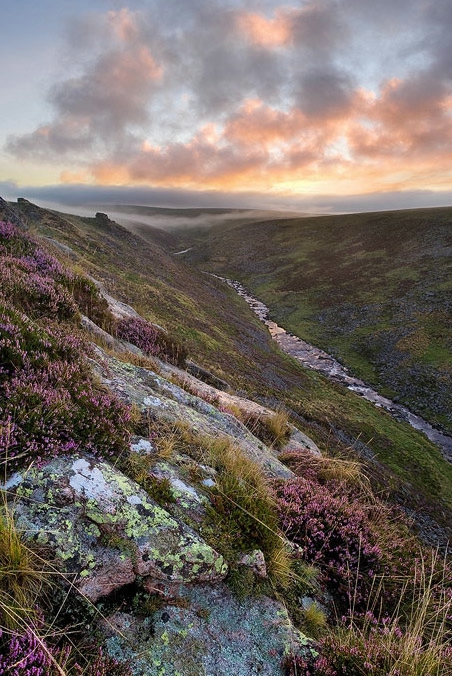 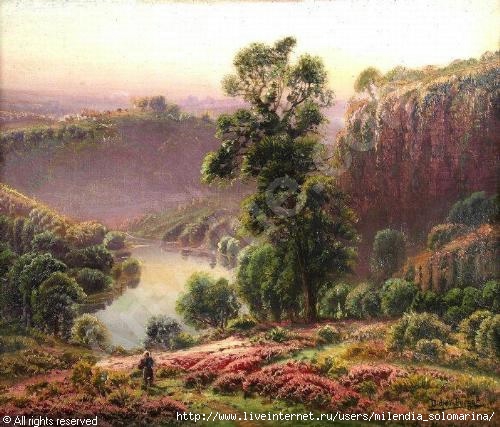 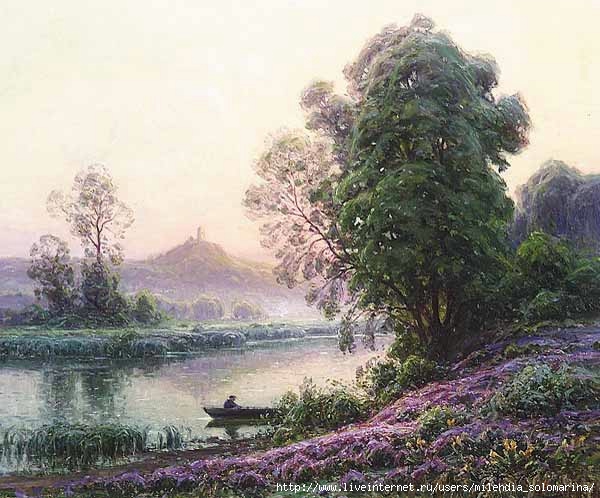 |
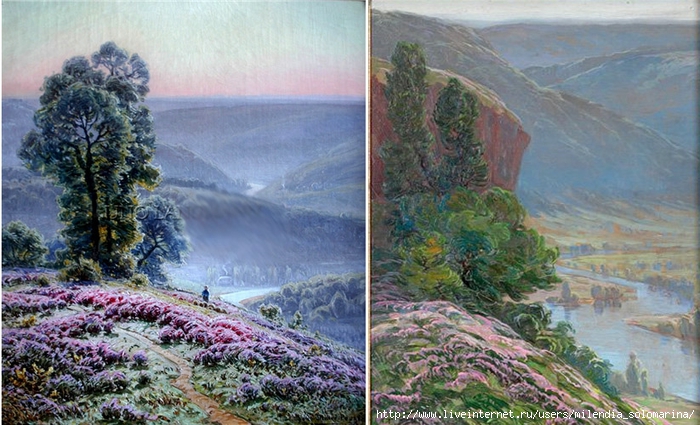
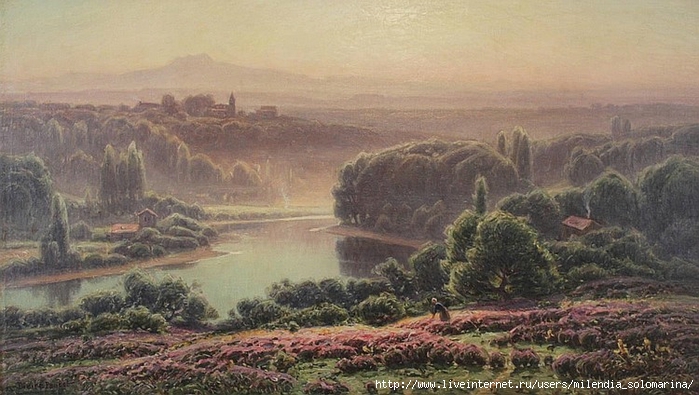
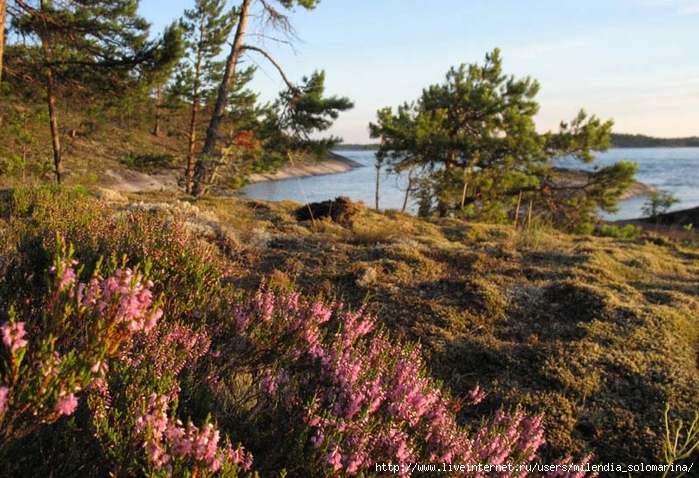
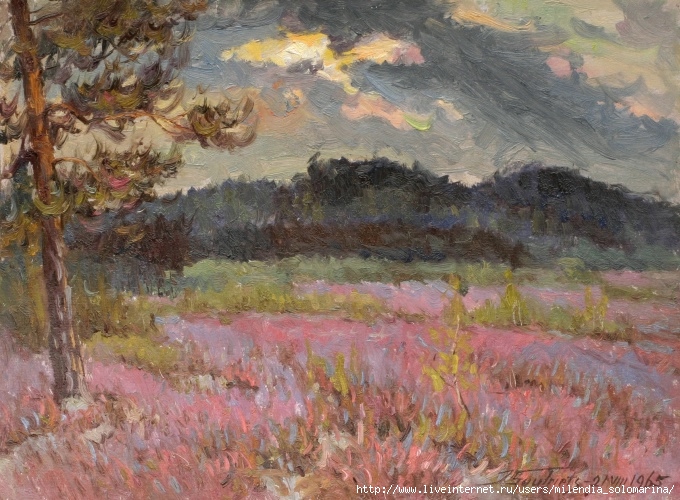
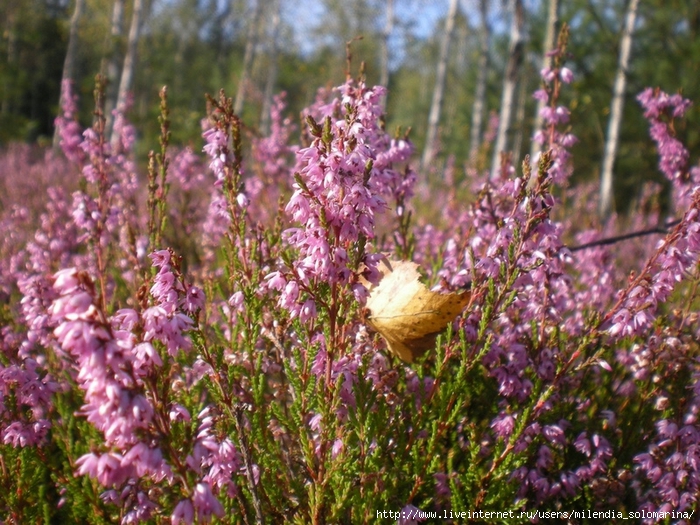
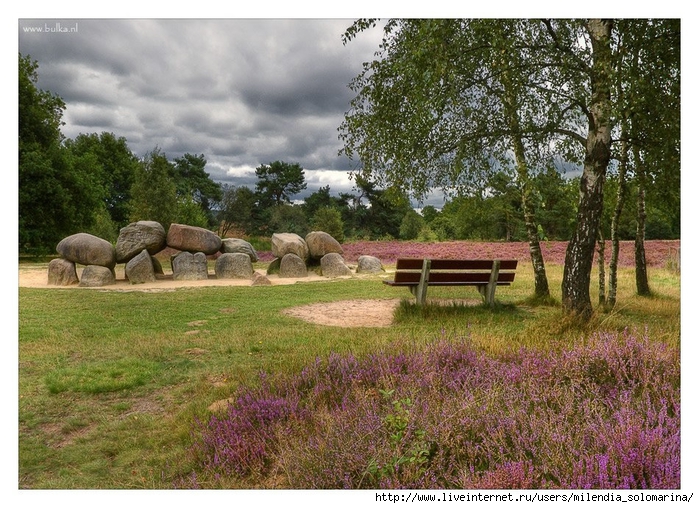
A video with a song version on English language"Heather Ale: A Galloway Legend
By Robert Louis Stevenson ":
The legend of heather honey, sung in songs, ballads and even in cartoons, goes back several millennia, according to some researchers. So long ago that no one would undertake to tell the exact dates, the Picts tribe lived on the territory of present-day Scotland among many other tribes. It was the Picts that became famous for their rock carvings - hence the concept of "pictogram" - and the recipe for Scottish ale.
The Legend of Heather Honey
When the Scottish tribes came to the lands of the Pictish people (and this happened in the fifth century AD), the Scottish (sounds rude, but based on legend, very appropriate) king, wishing to find out the recipe for the then not quite Scottish ale that admired him, which the local the inhabitants called "heather honey", ordered the chief of the tribe to tell how the Picts cook it.
 However, the leader of the Picts turned out to be a wise psychologist, a courageous man and a loyal ruler of his people. He deceived the king, saying that he would reveal the secret of making heather honey after the death of his son. The boy was thrown into the sea, and his father, fearing that the young man would give out under torture threatening to both of them the secret of making the drink coveted by the Scots, rushed at the king and pulled him into the abyss. This is how the leader of the Picts died and the recipe for making Scottish ale, which dates back thousands of years of history, was lost.
However, the leader of the Picts turned out to be a wise psychologist, a courageous man and a loyal ruler of his people. He deceived the king, saying that he would reveal the secret of making heather honey after the death of his son. The boy was thrown into the sea, and his father, fearing that the young man would give out under torture threatening to both of them the secret of making the drink coveted by the Scots, rushed at the king and pulled him into the abyss. This is how the leader of the Picts died and the recipe for making Scottish ale, which dates back thousands of years of history, was lost.
This harsh legend was described by R. Stevenson in his famous ballad. In Russian it is known in the translation by S.Ya. Marshak:
Heather drink
Forgotten a long time ago.
And he was sweeter than honey,
Drunker than wine.
They cooked it in cauldrons
And drank with the whole family
Baby Mead Brewers
In caves underground.
The king of Scots has come
Ruthless to enemies
He drove the poor picts
To the rocky shores.
On a heather field
On the battlefield
Lay alive on dead
And the dead is on the living.Summer has come in the country
The heather is blooming again
But there is no one to cook
Heather honey.
In their cramped graves,
In the mountains of the native land
Baby Mead Brewers
We found shelter for ourselves.
The king is riding the slope
Above the sea on a horse
And seagulls are flying nearby
On a par with the road.
The king looks sullenly:
“Again at my edge
Honey heather is blooming,
And we don't drink honey! "
But here are his vassals
Have noticed two
The last mead brews
Survivors.
They came out from under the stone,
Squinting at the white light -
Old humpback dwarf
And a boy of fifteen.
To the steep sea shore
They were brought in for questioning
But none of the prisoners
He didn’t say a word.
The king of Scots sat,
Without moving, in the saddle.
And little people
We stood on the ground.
The king angrily said:
"The torture of both awaits,
If you don’t say, damn it,
How did you prepare honey! "
The son and father were silent,
Standing at the edge of a cliff.
Heather rang above them,
Shafts rolled into the sea.
And suddenly a voice rang out:
"Listen, Scottish king,
Talk to you
Let me see you face to face!
Old age is afraid of death.
I'll buy life by betrayal,
I will give away the cherished secret! " -
The dwarf told the king.
His voice is sparrow
It sounded sharp and clear:
"I would have betrayed the secret long ago,
If the son did not interfere!
The boy does not feel sorry for his life,
He doesn't care about death ...
I sell my conscience
It will be ashamed to be with him.
Let him be tied tightly
And they will throw you into the abyss of waters -
And I will teach the Scots
Cooking old honey! .. "
Strong Scottish Warrior
Boy tied tight
And threw it into the open sea
From the coastal cliffs.
The waves closed over him.
Freeze the last cry ...
And echoed to him
From the cliff, the old father:
“I told the truth, the Scots,
I expected trouble from my son.
I did not believe in the fortitude of the young,
Do not shave their beards.
And the fire is not terrible for me.
Let it die with me
My holy secret
My heather honey! "
Older readers may remember the equally harsh cartoon soviet film based on this ballad. Those who do not remember or want to refresh their memory can do it - there is a video at the end of the article.
In the meantime, you can listen to the song "Heather Honey":
And we will return to the legend. And let's analyze it from the point of view of quite serious scientific research.
From the history of Scottish Ale
The history of this drink is inseparable from the history of the people who created it. So, the people of the Pictish people are one of the most mysterious. In legends dating back hundreds of years, this tribe is associated with a dwarf people who lived in caves. Somehow the Picts in these ancient texts resemble elves, they are similar to them with their bizarre features and strange behavior.
The Picts were ruled by their king, one of whose constant problems was to repel another attack from their neighbors. And the neighbors of the Pictish tribes were the Anglo-Saxons. It was believed that the Picts have magical abilities, which were supported by a mysterious potion - the very heather honey.
Archaeologists who excavated at one of the sites of the Neolithic period discovered the remains of earthenware containing traces of a drink obtained by fermentation from heather. So the legends have a very serious underlying reason.
But the question of bloody battles up to the last man from the Pictish tribe is most likely not correct by its very formulation. The fact is that the Scottish tribes who came to the land of the Picts were not conquerors, but immigrants. British historians tend to think that the Scots are descended from both the Picts and the Irish. So, the assimilation of two kindred peoples, usual in the historical perspective, took place.
It should be assumed that the loss of the Scottish ale recipe did not occur during the mixing of these peoples, but later, possibly at the beginning of the eighteenth century, when Scotland was deprived of its national customs as a result of the conquest of these lands and, accordingly, the peoples living on them, by England. It was then that it was ordered to make ale using only malt and hops.
However, the Scots resisted these prohibitions, preserving their traditions in the mountainous regions, which were difficult for the British conquerors to reach. Actually, these places were the historical homeland of the Pictish tribe.
The recipe for making heather honey was discovered in 1986 thanks to Bruce Williams and a certain mysterious lady who visited his store at his own brewery. The lady asked Williams to help her decipher a recipe for an old drink written in Old Scottish. However, after learning that this recipe required more than seven hours to prepare the drink, the lady abandoned her idea, limited herself to purchasing a regular brewing kit, and left the recipe in the store.
The first brewery to brew heather honey revived from oblivion was the small West Highland Brewery located in Argilla. When volumes increased, Scottish ale brewers moved to Alloa, to the larger McLay & Co facility. By the way, both the first and second breweries are located on the same lands that the Pictish tribe lived from time immemorial.
And from the very beginning of our century, the old beer has been produced by Heather Ale Ltd at a factory located near Glasgow, already in industrial volumes.
Features of the Scottish Ale recipe
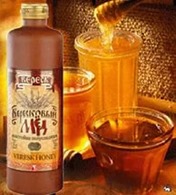 First of all, it should be noted that in ancient times, the malt used to make heather honey was brewed separately from the tops of the plant's branches until a wort was obtained. Only then the freshly collected heather flowers were added to it. Then all this mass was left to ferment for almost two weeks. During this time, the drink gradually became more and more saturated and dark, acquired a mild taste and amber color.
First of all, it should be noted that in ancient times, the malt used to make heather honey was brewed separately from the tops of the plant's branches until a wort was obtained. Only then the freshly collected heather flowers were added to it. Then all this mass was left to ferment for almost two weeks. During this time, the drink gradually became more and more saturated and dark, acquired a mild taste and amber color.
To revive the ancient drink, Williams had to make truly heroic efforts: he spent a long time choosing the right time to collect heather for making Scottish ale, diligently understanding the peculiarities of its preliminary processing. And I found out that only the tops of the plant should be used, since an almost imperceptible cohabitant appears on the lignified stalks of heather - moss, which, present in the finished drink, gives an undesirable aftertaste and a slight effect of the drug. Perhaps, it was thanks to this that the ancient heather honey had the same euphoric effect on the ancient tribes, due to which the Scots - all according to the same legends - felt a complete fusion with nature.
It is in such a difficult way that the famous Scottish ale came to us. And now - the promised animated film "Heather Honey":
Fears are an integral part of our entire life: fear of a new team, defeat, spiders, snakes, clowns, darkness, closed space ... This list is endless, and for many it also contains the familiar phenomenon of old age. This is not just a trivial fear, which, unfortunately, everyone faces sooner or later. Its influence on the human body is so significant that there is a separate definition for the fear of old age - gerontophobia. And the perplexity of this issue is even considered by a special science - gerontology. But does the normal physiological process of aging really deserve such attention? Let's take a look at this issue.
Where does the fear of old age come from?
First of all, it should be noted that people are not afraid of old age as such - they are afraid of it. possible consequences: changes in appearance, loneliness, changes. Obviously, we change with age (this has been observed since early age), but only in maturity does it seem to us that further changes can be disgusting. This often happens due to negative experience: for example, in childhood we were surrounded by unsympathetic grumpy old people who did not value their health and beauty at all. If we talk about the fear of being alone or becoming a burden, then the problem may also lie in our observations.But our personal empirical experience (what we see ourselves) does not mean that this is the only possible variant development of events. Surely, you have met personally or heard the stories of your friends about the most charming grandparents who live in perfect harmony, dress stylishly, in their 70s continue to go to the gym and walk until nightfall. Therefore, we can safely say that the point is in the human psychological predisposition to the perception of negative information. It's much easier for us to remember or notice bad things, and for a positive experience we need to make an effort.
How can you stop being afraid of old age and start living for your own pleasure? We have prepared three effective ways for you.
1. Live to the fullest, so that later you will not be sad about wasted
If we were simply afraid of old age, then this question is unlikely to be so acute. The problem is that this fear has a rather negative effect on our lives. Just think how much time did you spend in front of the mirror looking for a new wrinkle or gray hair? How much opportunity have you wasted getting frustrated with another one added to your age? No wonder Catherine Deneuve said: “I'm not afraid of old age. Youth is not good because you only think how not to grow old. " Therefore, you should pay more attention to your well-being today: play sports, eat right, go crazy, love and create. After all, if you live to the fullest, then there will be nothing to regret. 2. Accept and understand
Next important step in the fight against fear, it is the realization that old age is only a natural physiological process, in which even something beautiful can be found. For example, in Japan, samurai were forced to undergo a special practice about accepting old age and death. They were taught the irreversibility of these phenomena, that there is nothing terrible in this. As a result, samurai are still considered the most invincible warriors.In addition, if you turn what scares you in old age into pluses, life will become much easier. For example, the famous photographer Ari Seth Cohen makes who amaze and attract with their elegance and beauty. They do not hide their shortcomings, do not undergo plastic surgery and, on the contrary, are proud of their wrinkles and years. Some women have even made it onto the pages of Vogue.




3. Old age is not years
The third important point is that, no matter how strange it may sound, old age is invented. Yes, that's right. Our body never gets old, it does not have such a property: every cell of our body is constantly renewed. The only thing that wears out irrevocably is the lens of the eyes and part of the brain. Skin cells regenerate in 2 weeks, and blood is renewed in 150 days, liver in 1 year, stomach in 5 years, bones in 10 years, intestines in 16 years. You just physically cannot get old.Why do we change so over the years? It's all about our lifestyle. One hundred percent you have noticed that one woman can look 20 years old, and another - 40, although they will both be about 30. Nutrition, activity, alcohol consumption, smoking and other negative factors significantly slow down the natural process of rejuvenation of the body. So the secret of youth is the well-known secrets of health.
Don't try to force yourself to behave healthy image life. Just accept it as a part of your life, a part of yourself. Start enjoying how great you feel and how beautiful you look. Then no one will ever be able to even guess how old you are, after which you will have to blush when men several times your age will look after you.
Forget about old age, forget about fears! Life is too short to be wasted on such useless things. Therefore, remember that an intelligent woman only grows prettier with age, and a wise woman is always beautiful.

